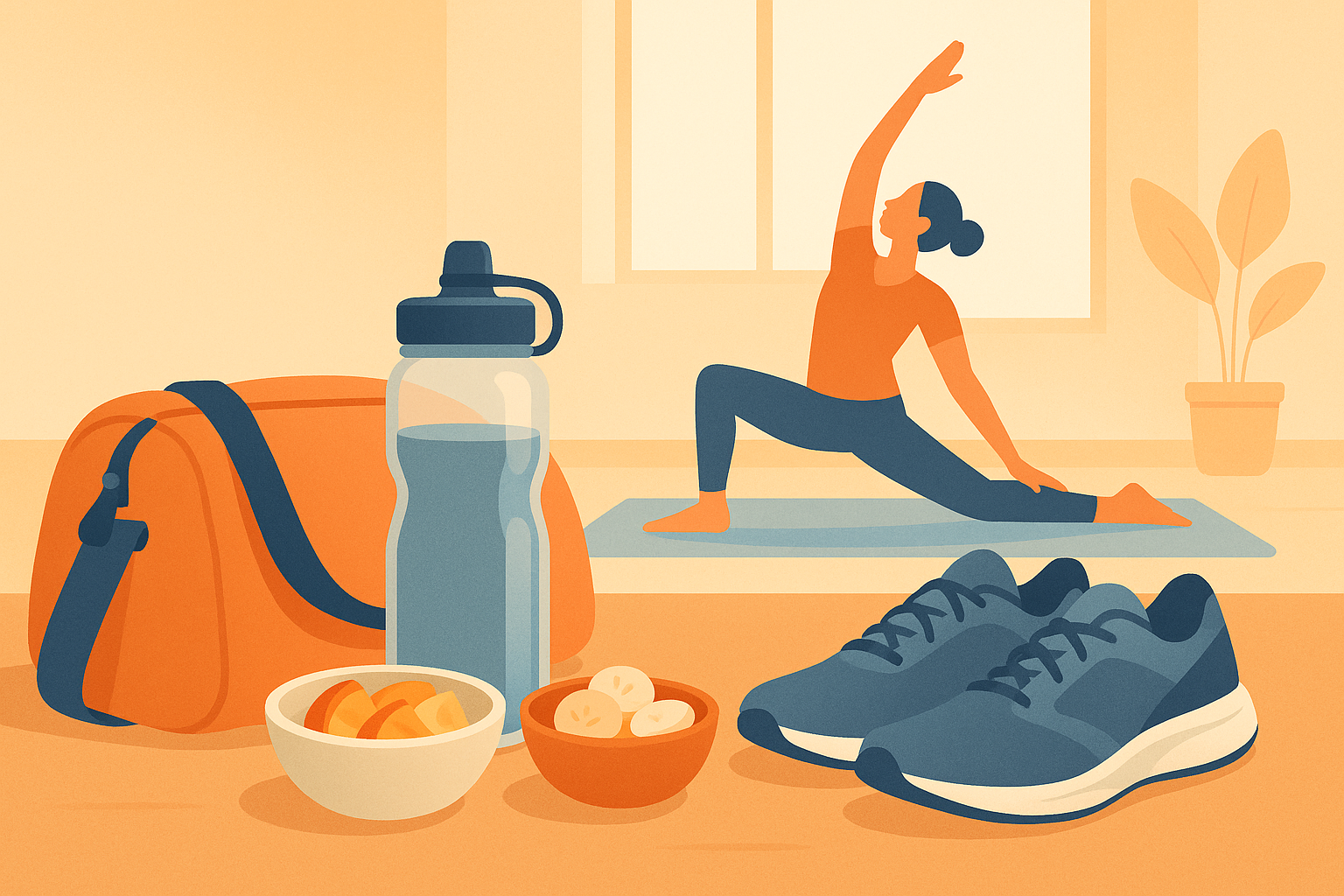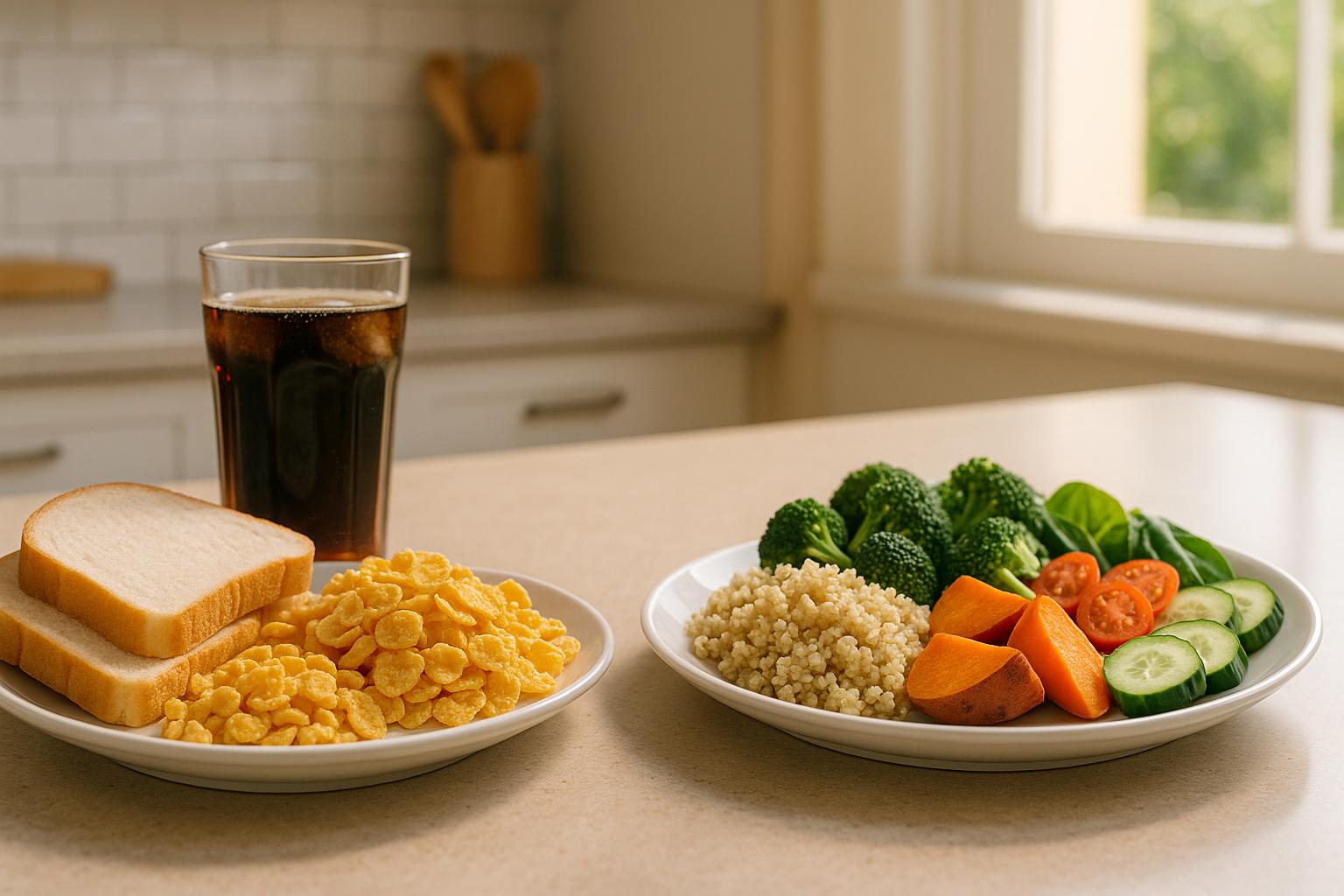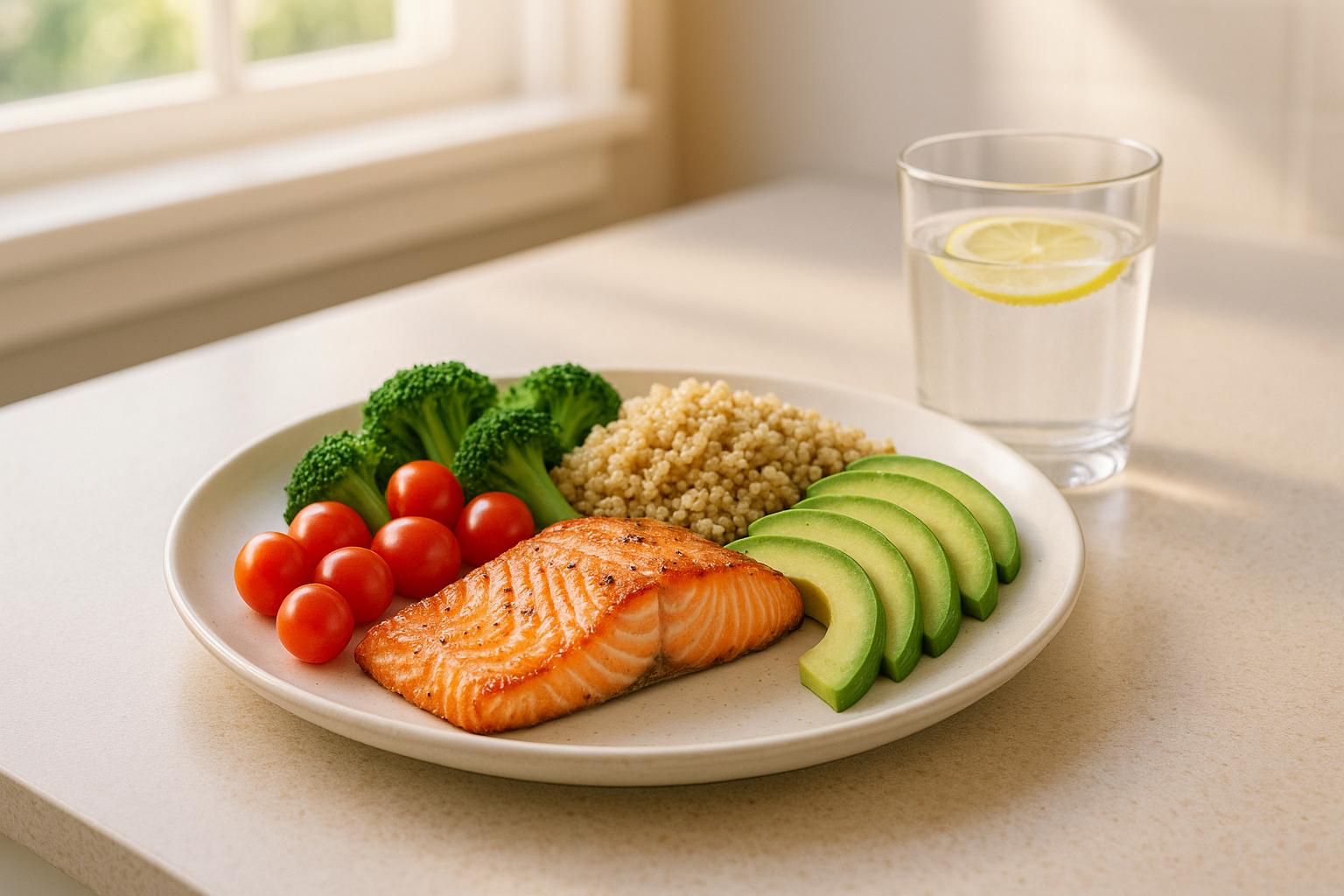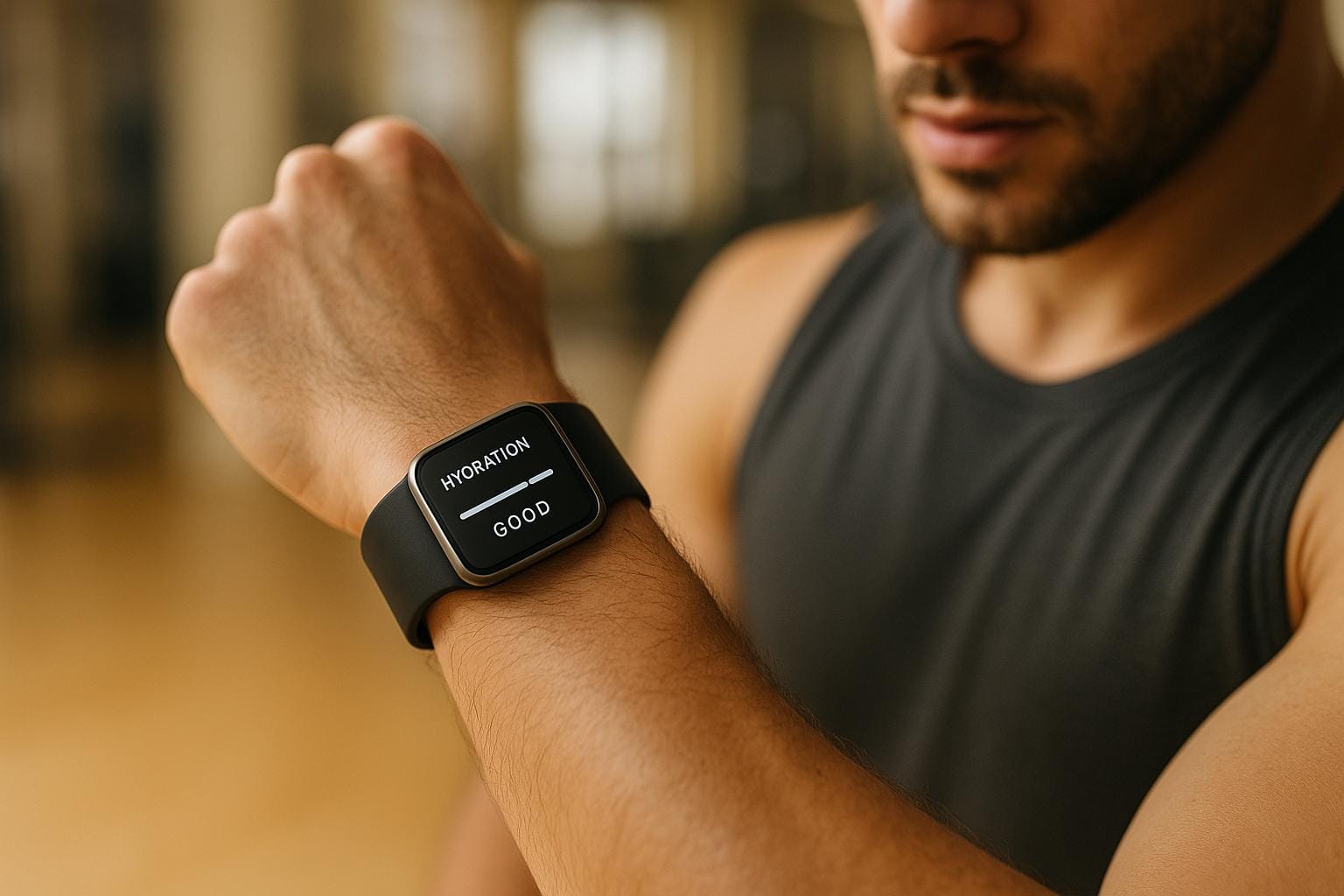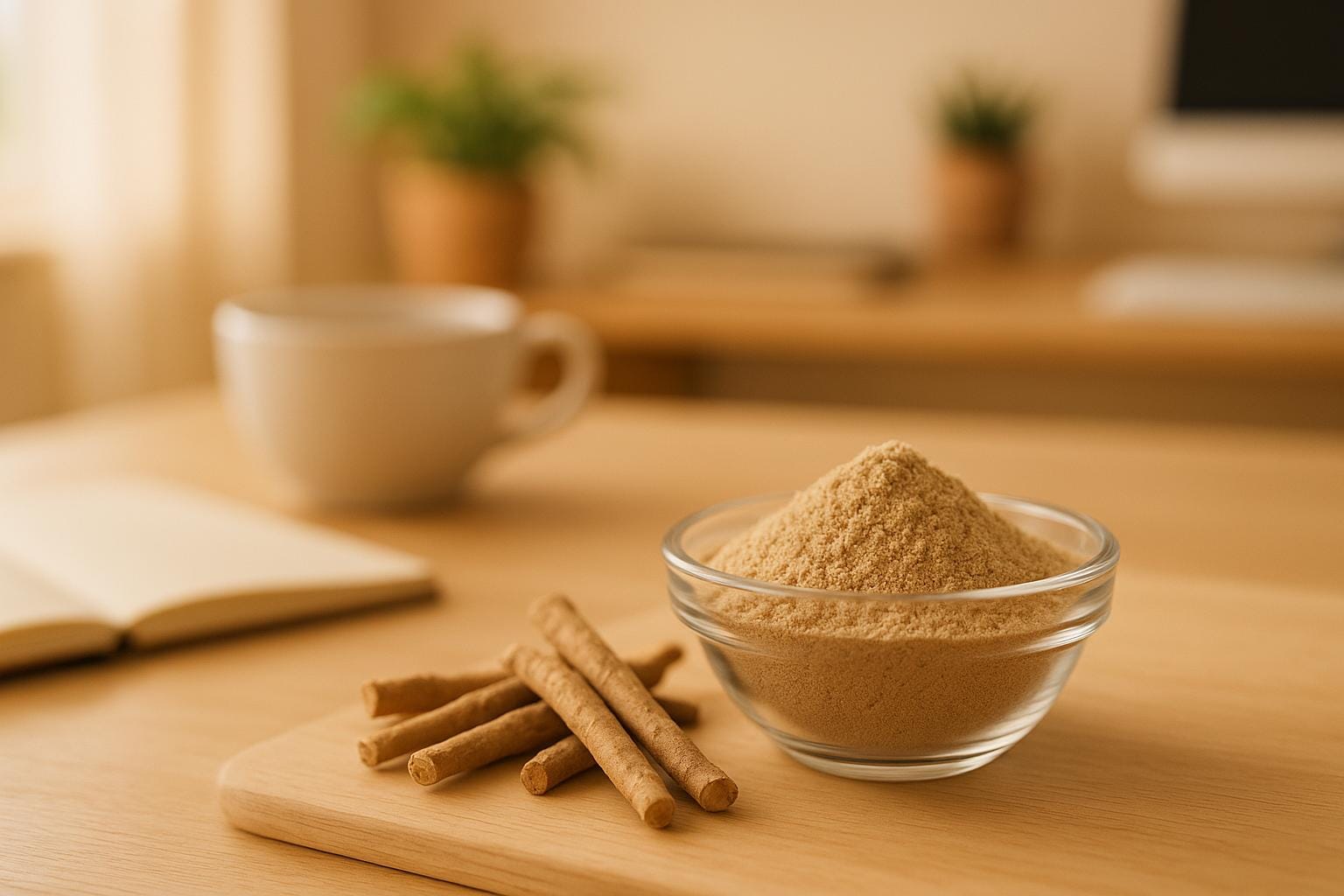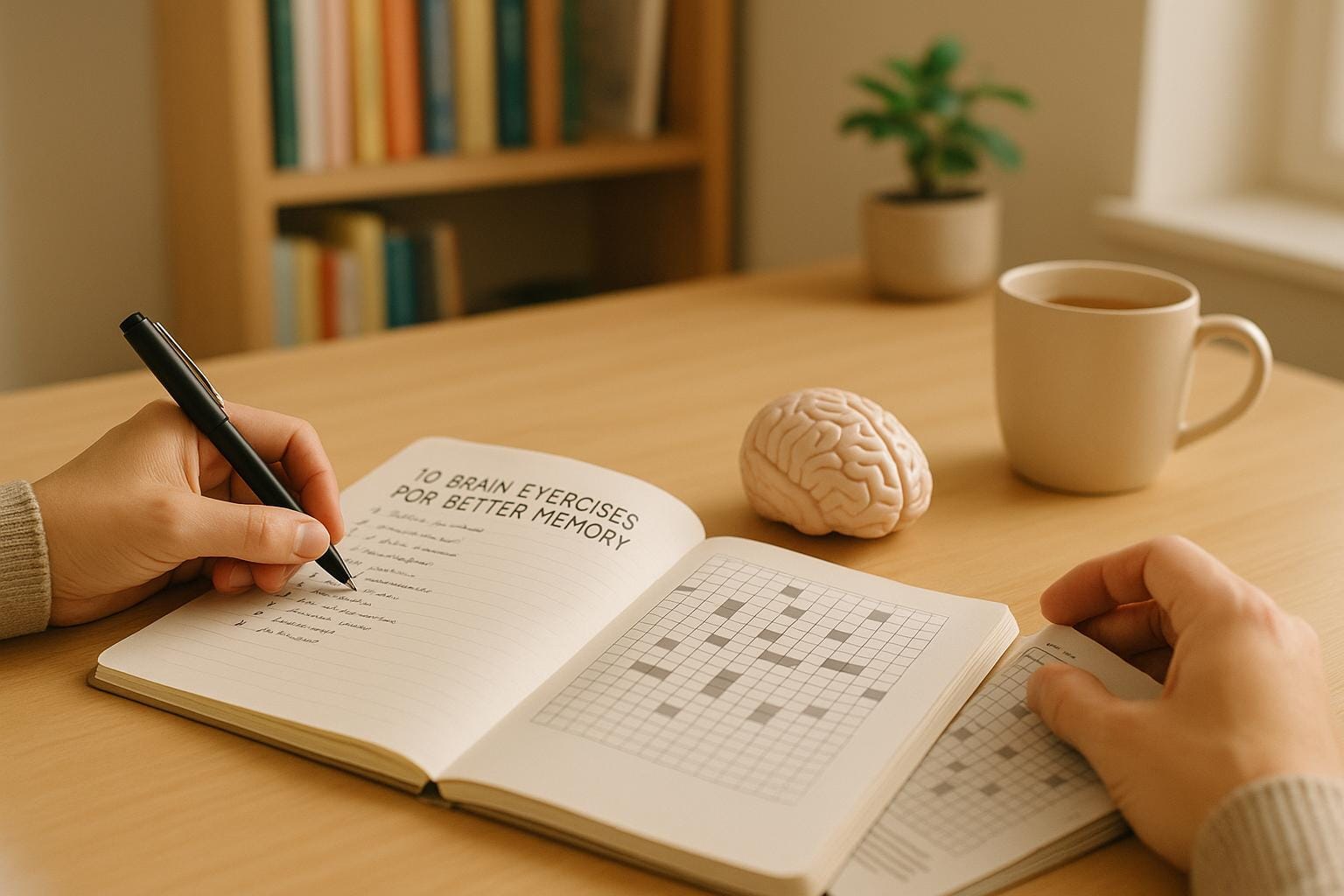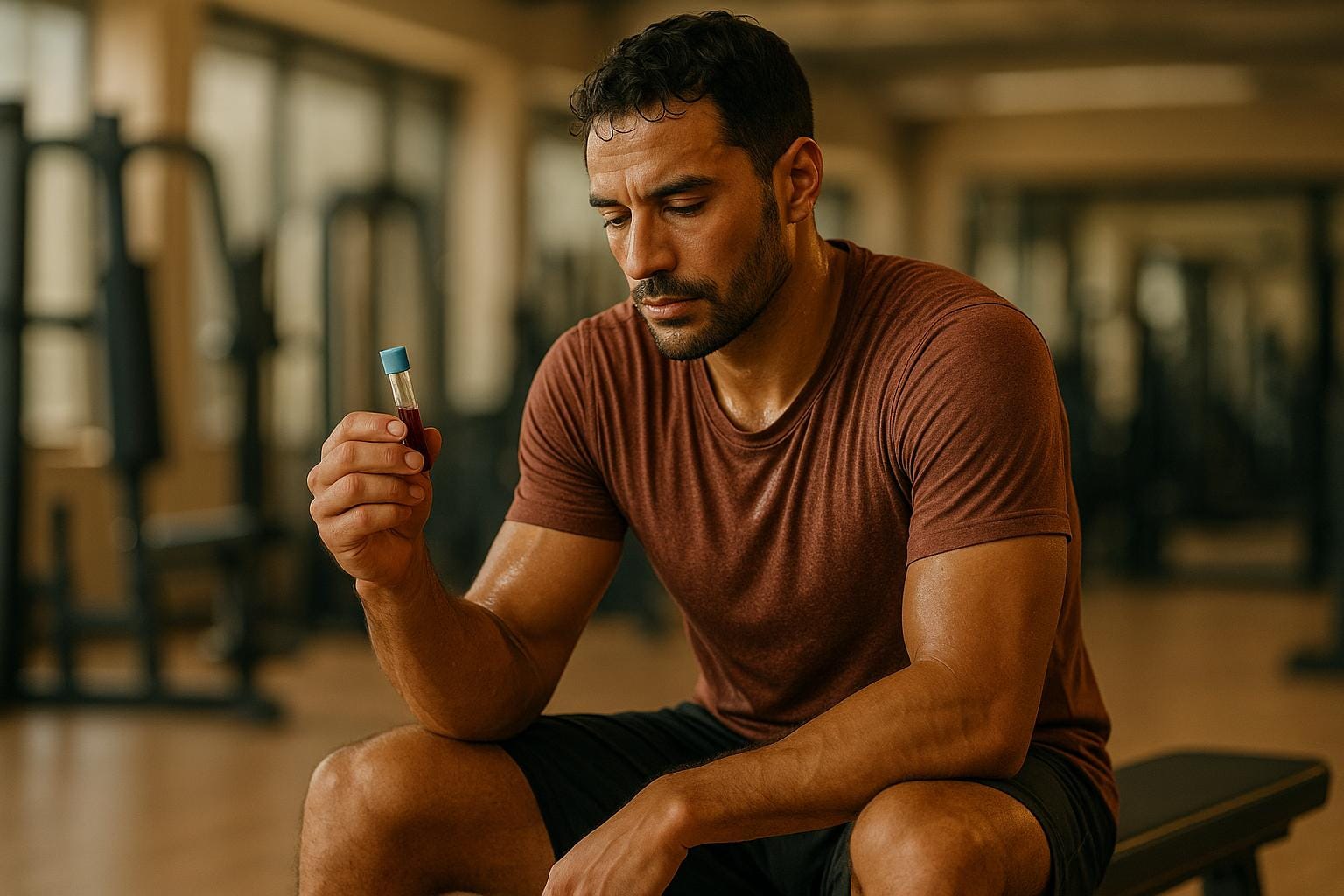Starting your workout right can boost performance, prevent injuries, and improve recovery. Here’s a quick pre-workout checklist:
- Hydration: Drink water consistently before, during, and after exercising. Men need about 15.5 cups/day, women 11.5 cups/day.
- Nutrition: Eat a mix of carbs and protein depending on timing:
- 3–4 hours before: Full meal (e.g., oatmeal with berries).
- 30–60 minutes before: Light snack (e.g., banana with crackers).
- Warm-Up: Spend 5–10 minutes on dynamic movements like jogging, lunges, and planks to prepare muscles and prevent injuries.
- Mental Focus: Use deep breathing or visualization to reduce stress and improve focus.
- Equipment Check: Pack essentials (hydration, clothing, safety gear) and inspect for damage.
With these steps, you’ll be ready for a productive and safe workout session.
9 Best Things to do Before a Workout
Water and Hydration
Staying hydrated plays a key role in your workout performance and recovery. Studies reveal that even slight dehydration can reduce muscle strength, power, and endurance.
Daily Water Needs
The U.S. National Academies of Sciences, Engineering, and Medicine offers recommendations for daily water intake:
| Gender | Recommended Daily Intake |
|---|---|
| Men | 15.5 cups (3.7 liters) |
| Women | 11.5 cups (2.7 liters) |
However, individual water needs can vary depending on factors like exercise intensity, weather, diet, and overall health.
"Experts recommend that males consume 15.5 cups (3.7 liters) of water daily and females 11.5 cups (2.7 liters) of water a day. But environmental factors such as temperature and other health conditions may affect your water needs." - Kris Gunnars, BSc
When to Drink Before Exercise
To perform your best, drink water consistently before, during, and after exercise. Don’t wait until you’re thirsty - make hydration a regular part of your pre-workout routine. This habit also supports the effectiveness of your pre-workout meal.
Check Your Hydration
Keeping an eye on your hydration levels is crucial. Thirst alone isn’t always a reliable indicator, so be proactive about your water intake. Once you're properly hydrated, you can shift your focus to fueling your body with the right pre-workout nutrition.
This article is for informational purposes only and is not intended as medical advice. Please consult a healthcare professional before starting any new fitness or wellness routine.
Pre-Workout Meal Planning
Getting your pre-workout nutrition right can make a big difference in how you perform. The right mix of nutrients, eaten at the right time, helps keep your energy up and your muscles working efficiently.
Meal Timing and Size
When you eat before exercising matters just as much as what you eat. Here’s a quick guide to help you plan based on how much time you have before your workout:
| Timing Before Workout | Meal Type | Key Nutrients |
|---|---|---|
| 3-4 hours | Full meal | Complex carbs with moderate protein |
| 2-3 hours | Medium meal | A mix of complex carbs and lighter protein |
| 30-60 minutes | Light snack | Simple carbs with minimal protein |
Food Choices
Carbohydrates should be your main focus, with moderate protein and as little fat as possible. Carbohydrate needs vary, but typically range from 1.8–3.6 grams per pound of body weight.
Here are some meal ideas based on how much time you have to prepare:
For 2–4 hours before your workout:
- Oatmeal mixed with protein powder and topped with fresh berries
- Brown rice paired with grilled chicken and steamed broccoli
- Quinoa salad with chickpeas and fresh veggies
- Greek yogurt topped with granola and mixed fruit
For 30–60 minutes before your workout:
- A banana with a handful of whole-grain crackers
- Apple slices with a light spread of almond butter
- A fruit smoothie made with water or low-fat milk
Supplement Options
Supplements can enhance your pre-workout routine if used correctly. Take these 30–45 minutes before exercising:
- Creatine: Helps with strength and power
- BCAAs: May reduce muscle fatigue
- Caffeine: Provides a boost in focus and energy
- Beta-alanine: Can improve endurance
Always check with a healthcare provider before starting any new supplements. With your nutrition handled, you'll be ready to move on to preparing your body for exercise in the next section.
This article is for informational purposes only and does not substitute for medical advice. Consult a healthcare professional before starting any fitness or wellness routine.
Warm-Up Exercises
Why Warm-Ups Matter
Starting your workout with a proper warm-up can boost your performance and lower the risk of injuries. Dynamic warm-ups get your blood flowing, warm up your muscles, and improve your range of motion. They also help prepare your body for the movements you’ll be doing, improving strength, mobility, and coordination while gradually increasing your heart rate.
Simple Warm-Up Routine
Spend 5–10 minutes warming up large muscle groups before diving into specific exercises. Here's a suggested routine:
| Movement | Duration/Reps | Focus Area |
|---|---|---|
| Light jogging/marching | 2–3 minutes | Circulation |
| Arm circles | 10 forward, 10 back | Shoulders and upper body |
| Bodyweight squats | 12–15 reps | Lower body |
| Walking lunges | 10 per leg | Hips and legs |
| Plank holds | 30 seconds | Core activation |
| Side lunges | 10 per side | Inner thighs and hips |
Start at a slow pace and gradually increase intensity to avoid straining your muscles.
Tailoring Warm-Ups to Your Workout
Adjust your warm-up based on the type of exercise you’re about to do:
For Cardio Workouts:
- Spend the first 5 minutes doing the planned activity at a slower pace. For example, if you’re running, start with a brisk walk or light jog.
For Strength Training:
- Incorporate dynamic movements that mimic your planned exercises.
- Target the muscle groups you’ll be working on.
- Do lighter versions of the exercises you’ll perform during the session.
For more intense workouts, extend your warm-up time to ensure your body is fully prepared. Once your body is ready, consider including mental focus techniques to get into the right mindset for your workout.
Mental Focus Tips
Mental readiness plays a key role in achieving peak performance, just like physical preparation. Studies show that maintaining proper mental focus can greatly enhance exercise performance and help sustain proper form.
Focus Exercises
Here are some effective mind-focusing techniques to incorporate into your routine:
- Deep breathing: Breathe in for 4 counts, hold for 2 counts, and exhale for 4 counts. Repeat for 2–3 minutes to reduce stress and improve oxygen flow.
- Visualization: Spend 5 minutes mentally rehearsing your workout, focusing on perfect form and engaging the right muscles.
"My thoughts before a big race are usually pretty simple. I tell myself: Get out of the blocks, run your race, stay relaxed. If you run your race, you'll win... channel your energy and focus."
Other mental exercises to try include:
| Mental Exercise | Duration | Purpose |
|---|---|---|
| Deep breathing | 2–3 minutes | Reduce stress and increase oxygen flow |
| Body scan | 3–5 minutes | Release muscle tension and boost awareness |
| Visualization | 5 minutes | Mentally rehearse perfect form |
| Mindful warm-up | During warm-up | Improve muscle activation |
Progress Tracking
Tracking your progress can help you stay motivated and identify areas for improvement. Tools like MyFitnessPal make it easy to:
- Log daily nutrition and workouts
- Set realistic fitness goals
- Track water intake and exercise duration
For a deeper dive into your performance, WHOOP offers advanced tracking features. It monitors:
- Sleep quality and patterns
- Physical strain levels
- Recovery metrics
- Stress indicators
WHOOP’s AI-powered coach analyzes your data to deliver personalized tips for improving both mental and physical readiness.
Once your mental focus and tracking are in place, double-check your equipment to ensure everything is ready for peak performance.
This article is for informational purposes only and is not intended as medical advice. Please consult a healthcare professional before starting any new fitness or wellness routine.
Equipment Preparation
Once your mind is ready and your body fueled, it's time to prep your gear. Well-prepared equipment not only helps you perform better but also reduces the risk of injury. In fact, faulty gear was linked to over 409,000 injuries in 2021.
Essentials to Pack
Use a compact, water-resistant gym bag to organize these must-haves:
| Category | Essentials | Extras |
|---|---|---|
| Clothing | Sweat-wicking shirts, shorts/leggings, fresh socks | Spare outfit, compression wear |
| Footwear | Training shoes, shower sandals | Sport-specific shoes |
| Hydration | 32oz water bottle | Electrolyte packets |
| Safety | First-aid kit, athletic tape | Lifting gloves, knee wraps |
| Hygiene | Sweat towel, toiletries | Antibacterial wipes |
For specialized workouts, make sure to pack activity-specific gear:
- Powerlifting: Chalk or liquid grip, wrist wraps, weightlifting tape
- Swimming: Swim cap, goggles, earplugs
- Boxing: Hand wraps, mouth guard
Dressing for the Weather
Check the forecast to choose the right clothing:
- Below 45°F: Wear a moisture-wicking base layer with an insulating mid-layer.
- 45–65°F: A light jacket or long-sleeve technical shirt works well.
- Above 65°F: Stick to breathable, lightweight clothing.
Setting Up Your Devices
Before starting your session, make sure your fitness devices are ready to go:
-
Smartwatch or Heart Rate Monitor
- Switch to U.S. units (miles, pounds) and 12-hour time format.
- Adjust your workout goals as needed.
-
Fitness Apps
- Sync them with your devices.
- Enter your current weight in pounds.
- Set up workout templates for quick access.
Finally, inspect all your equipment for any damage. Check for frayed cables, loose parts, or wear and tear that could affect safety.
With everything in place, you're all set for a productive and focused workout session.
This article is for informational purposes only and is not intended as medical advice. Please consult a healthcare professional before starting any new fitness or wellness routine.
Conclusion
Having a solid pre-workout routine can significantly improve your fitness results. Studies indicate that proper preparation helps reduce the risk of injuries while improving overall performance.
"With proper preparation, you can be able to work harder which means that your gym progress will move into the right direction. The routine also helps to reduce muscle damage and encourages faster healing in an aim to reduce the risk of sprains, strains and fractures that are quite common in fitness." - Craig Wilson
This advice highlights three important steps for getting the most out of your workouts:
- Eat 15–30g of carbohydrates about 15–30 minutes before exercising.
- Incorporate dynamic warm-ups into your routine.
- Stay hydrated by monitoring your fluid intake throughout your session.
Athletes who follow consistent pre-workout routines often experience improved endurance, higher energy levels, and quicker recovery times. Treating your pre-workout steps as a priority can help you perform better and support long-term fitness goals.
This article is for informational purposes only and is not intended as medical advice. Always consult a healthcare professional before starting any new fitness or wellness routine.
FAQs
How can I figure out how much water I need to stay hydrated during my workout?
To determine your hydration needs, calculate your sweat rate. Start by weighing yourself before and after a workout. Track how much water you drink during exercise and note the duration of your session. The difference in your weight, adjusted for fluid intake, reflects how much water you lose per hour. This is roughly the amount you should aim to replace during similar workouts.
Keep in mind that factors like temperature, intensity, and individual sweat levels can affect your hydration needs. Staying properly hydrated helps maintain energy, focus, and performance, so make it a priority!
What are some simple mental techniques to boost focus before a workout?
To sharpen your focus before a workout, try visualization and mindfulness techniques. Visualization involves mentally rehearsing your workout - imagine yourself successfully completing exercises with proper form and energy. This can help boost confidence and prepare your mind for peak performance.
Mindfulness techniques, such as focusing on your breath or doing a quick 2-3 minute meditation, can reduce distractions and improve concentration. These practices train your mind to stay present, helping you get the most out of your workout. Consistency with these techniques can lead to noticeable improvements in focus and overall results.
What should I eat if I only have 30 minutes or less before my workout?
If you're short on time, focus on eating easily digestible foods that provide quick energy. Opt for snacks rich in carbohydrates with a small amount of protein to fuel your workout without causing discomfort.
Great options include:
- A banana with a small spoonful of peanut butter
- A slice of toast with jam
- A handful of pretzels or crackers
Avoid heavy meals or foods high in fat and fiber, as they take longer to digest and may leave you feeling sluggish. Aim to hydrate with water as well to stay properly fueled and ready to go.


